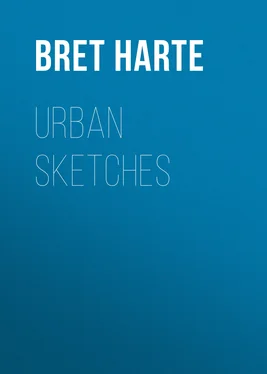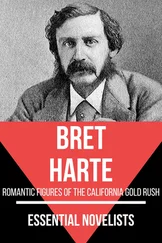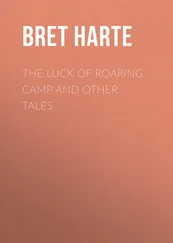Bret Harte - Urban Sketches
Здесь есть возможность читать онлайн «Bret Harte - Urban Sketches» — ознакомительный отрывок электронной книги совершенно бесплатно, а после прочтения отрывка купить полную версию. В некоторых случаях можно слушать аудио, скачать через торрент в формате fb2 и присутствует краткое содержание. Жанр: foreign_sf, literature_19, foreign_antique, foreign_prose, на английском языке. Описание произведения, (предисловие) а так же отзывы посетителей доступны на портале библиотеки ЛибКат.
- Название:Urban Sketches
- Автор:
- Жанр:
- Год:неизвестен
- ISBN:нет данных
- Рейтинг книги:3 / 5. Голосов: 1
-
Избранное:Добавить в избранное
- Отзывы:
-
Ваша оценка:
- 60
- 1
- 2
- 3
- 4
- 5
Urban Sketches: краткое содержание, описание и аннотация
Предлагаем к чтению аннотацию, описание, краткое содержание или предисловие (зависит от того, что написал сам автор книги «Urban Sketches»). Если вы не нашли необходимую информацию о книге — напишите в комментариях, мы постараемся отыскать её.
Urban Sketches — читать онлайн ознакомительный отрывок
Ниже представлен текст книги, разбитый по страницам. Система сохранения места последней прочитанной страницы, позволяет с удобством читать онлайн бесплатно книгу «Urban Sketches», без необходимости каждый раз заново искать на чём Вы остановились. Поставьте закладку, и сможете в любой момент перейти на страницу, на которой закончили чтение.
Интервал:
Закладка:
Bret Harte
Urban Sketches
A VENERABLE IMPOSTOR
As I glance across my table, I am somewhat distracted by the spectacle of a venerable head whose crown occasionally appears beyond, at about its level. The apparition of a very small hand—whose fingers are bunchy and have the appearance of being slightly webbed—which is frequently lifted above the table in a vain and impotent attempt to reach the inkstand, always affects me as a novelty at each recurrence of the phenomenon. Yet both the venerable head and bunchy fingers belong to an individual with whom I am familiar, and to whom, for certain reasons hereafter described, I choose to apply the epithet written above this article.
His advent in the family was attended with peculiar circumstances. He was received with some concern—the number of retainers having been increased by one in honor of his arrival. He appeared to be weary,—his pretence was that he had come from a long journey,—so that for days, weeks, and even months, he did not leave his bed except when he was carried. But it was remarkable that his appetite was invariably regular and healthy, and that his meals, which he required should be brought to him, were seldom rejected. During this time he had little conversation with the family, his knowledge of our vernacular being limited, but occasionally spoke to himself in his own language,—a foreign tongue. The difficulties attending this eccentricity were obviated by the young woman who had from the first taken him under her protection,—being, like the rest of her sex, peculiarly open to impositions,—and who at once disorganized her own tongue to suit his. This was affected by the contraction of the syllables of some words, the addition of syllables to others, and an ingenious disregard for tenses and the governing powers of the verb. The same singular law which impels people in conversation with foreigners to imitate their broken English governed the family in their communications with him. He received these evidences of his power with an indifference not wholly free from scorn. The expression of his eye would occasionally denote that his higher nature revolted from them. I have no doubt myself that his wants were frequently misinterpreted; that the stretching forth of his hands toward the moon and stars might have been the performance of some religious rite peculiar to his own country, which was in ours misconstrued into a desire for physical nourishment. His repetition of the word “goo-goo,”—which was subject to a variety of opposite interpretations,—when taken in conjunction with his size, in my mind seemed to indicate his aboriginal or Aztec origin.
I incline to this belief, as it sustains the impression I have already hinted at, that his extreme youth is a simulation and deceit; that he is really older and has lived before at some remote period, and that his conduct fully justifies his title as A Venerable Impostor. A variety of circumstances corroborate this impression: His tottering walk, which is a senile as well as a juvenile condition; his venerable head, thatched with such imperceptible hair that, at a distance, it looks like a mild aureola, and his imperfect dental exhibition. But beside these physical peculiarities may be observed certain moral symptoms, which go to disprove his assumed youth. He is in the habit of falling into reveries, caused, I have no doubt, by some circumstance which suggests a comparison with his experience in his remoter boyhood, or by some serious retrospection of the past years. He has been detected lying awake, at times when he should have been asleep, engaged in curiously comparing the bed-clothes, walls, and furniture with some recollection of his youth. At such moments he has been heard to sing softly to himself fragments of some unintelligible composition, which probably still linger in his memory as the echoes of a music he has long outgrown. He has the habit of receiving strangers with the familiarity of one who had met them before, and to whom their antecedents and peculiarities were matters of old acquaintance, and so unerring is his judgment of their previous character that when he withholds his confidence I am apt to withhold mine. It is somewhat remarkable that while the maturity of his years and the respect due to them is denied by man, his superiority and venerable age is never questioned by the brute creation. The dog treats him with a respect and consideration accorded to none others, and the cat permits a familiarity which I should shudder to attempt. It may be considered an evidence of some Pantheistic quality in his previous education, that he seems to recognize a fellowship even in inarticulate objects; he has been known to verbally address plants, flowers, and fruit, and to extend his confidence to such inanimate objects as chairs and tables. There can be little doubt that, in the remote period of his youth, these objects were endowed with not only sentient natures, but moral capabilities, and he is still in the habit of beating them when they collide with him, and of pardoning them with a kiss.
As he has grown older—rather let me say, as we have approximated to his years—he has, in spite of the apparent paradox, lost much of his senile gravity. It must be confessed that some of his actions of late appear to our imperfect comprehension inconsistent with his extreme age. A habit of marching up and down with a string tied to a soda-water bottle, a disposition to ride anything that could by any exercise of the liveliest fancy be made to assume equine proportions, a propensity to blacken his venerable white hair with ink and coal dust, and an omnivorous appetite which did not stop at chalk, clay, or cinders, were peculiarities not calculated to excite respect. In fact, he would seem to have become demoralized, and when, after a prolonged absence the other day, he was finally discovered standing upon the front steps addressing a group of delighted children out of his limited vocabulary, the circumstance could only be accounted for as the garrulity of age.
But I lay aside my pen amidst an ominous silence and the disappearance of the venerable head from my plane of vision. As I step to the other side of the table, I find that sleep has overtaken him in an overt act of hoary wickedness. The very pages I have devoted to an exposition of his deceit he has quietly abstracted, and I find them covered with cabalistic figures and wild-looking hieroglyphs traced with his forefinger dipped in ink, which doubtless in his own language conveys a scathing commentary on my composition. But he sleeps peacefully, and there is something in his face which tells me that he has already wandered away to that dim region of his youth where I cannot follow him. And as there comes a strange stirring at my heart when I contemplate the immeasurable gulf which lies between us, and how slight and feeble as yet is his grasp on this world and its strange realities, I find, too late, that I also am a willing victim of the Venerable Impostor.
FROM A BALCONY
The little stone balcony, which, by a popular fallacy, is supposed to be a necessary appurtenance of my window, has long been to me a source of curious interest. The fact that the asperities of our summer weather will not permit me to use it but once or twice in six months does not alter my concern for this incongruous ornament. It affects me as I suppose the conscious possession of a linen coat or a nankeen trousers might affect a sojourner here who has not entirely outgrown his memory of Eastern summer heat and its glorious compensations,—a luxurious providence against a possible but by no means probable contingency. I do no longer wonder at the persistency with which San Franciscans adhere to this architectural superfluity in the face of climatical impossibilities. The balconies in which no one sits, the piazzas on which no one lounges, are timid advances made to a climate whose churlishness we are trying to temper by an ostentation of confidence. Ridiculous as this spectacle is at all seasons, it is never more so than in that bleak interval between sunset and dark, when the shrill scream of the factory whistle seems to have concentrated all the hard, unsympathetic quality of the climate into one vocal expression. Add to this the appearance of one or two pedestrians, manifestly too late for their dinners, and tasting in the shrewish air a bitter premonition of the welcome that awaits them at home, and you have one of those ordinary views from my balcony which makes the balcony itself ridiculous.
Читать дальшеИнтервал:
Закладка:
Похожие книги на «Urban Sketches»
Представляем Вашему вниманию похожие книги на «Urban Sketches» списком для выбора. Мы отобрали схожую по названию и смыслу литературу в надежде предоставить читателям больше вариантов отыскать новые, интересные, ещё непрочитанные произведения.
Обсуждение, отзывы о книге «Urban Sketches» и просто собственные мнения читателей. Оставьте ваши комментарии, напишите, что Вы думаете о произведении, его смысле или главных героях. Укажите что конкретно понравилось, а что нет, и почему Вы так считаете.












